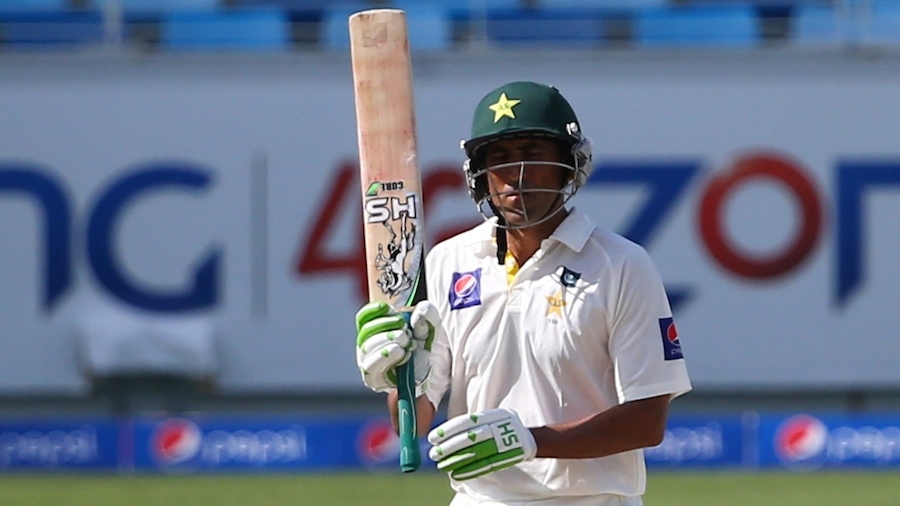(ESPNcricinfo)
Pakistan 219 for 4 (Younis Khan 106, Misbah 34*, Johnson 3-22) v Australia
Twelve years ago, Younis Khan played in Pakistan’s only previous Test match meetings with Australia in the UAE. A 3-0 sweep for Steve Waugh’s side included one Sharjah match that lasted only two days. When he walked to the centre of the Dubai International Stadium at 7 for 2 in the fourth over, Younis could have been forgiven for post-traumatic flashbacks to Pakistan’s tallies of 59 and 53.
There have been other things on Younis’ mind too, notably his omission from the ODI squad mere months from next year’s World Cup. By day’s end the Australians were ruing his inclusion, as a chanceless innings of 106 lifted Pakistan out of the early mire and showed that the team of Michael Clarke remains decidedly mortal on a slow surface.
Mitchell Johnson was a threat in every session, topping and tailing the day with a pair of new-ball lbws, and Peter Siddle showed typical discipline and also increased pace since he was dropped in South Africa. But the spinners Nathan Lyon and debutant Steve O’Keefe went wicketless, as did the allrounder Mitchell Marsh. Ryan Harris was sorely missed, and Shane Watson’s changes of pace and reverse swing may have come in handy.
Azhar Ali and Misbah-ul-Haq offered useful support to Younis, the former helping in the addition of 108 to establish a foundation after early losses, and the latter shrugging off Australian talk of targeting the captain by compiling his runs with typical understatement. A tally beyond 350 on day two will test Clarke’s men, for the pitch is the same strip used for the earlier ODI and Twenty20 fixtures, and is already dusting up considerably.
Pakistan had announced two debutants, the right-arm pace bowler Imran Khan and the legspinner Yasir Shah. Australia also handed out dual debuts. Marsh’s baggy green cap was presented by his father, Geoff Marsh, who was also on hand to do the same for his older son Shaun Marsh when he debuted in Sri Lanka in 2011. Dean Jones presented O’Keefe’s cap.
Johnson started out as if to continue last summer’s reign of terror, pushing Mohammad Hafeez onto the back foot before pinning his front with a fast and swerving yorker. Smarting from what was at the very least a badly bruised foot, Hafeez reviewed the lbw verdict of Marais Erasmus but need not have bothered.
At the other end Siddle showed he had regained the snap required of him by Australia’s coach Darren Lehmann, consistently topping 140kph while maintaining a tight line. One such delivery seamed back at Ahmed Shehzad, who left leg stump exposed to harm and was duly bowled.
Neither Younis nor Azhar looked entirely comfortable to begin with, but after the early swing subsided there was little in the pitch for Johnson, Siddle or Marsh. O’Keefe was tidy without gaining any turn, and when Lyon joined the attack he was dissuaded from bowling over the wicket into Johnson’s footmarks by a single-swept boundary from Azhar.
Johnson was used in short bursts by Clarke, and three overs before lunch he harangued Azhar with a few verbals. The unsubtle tactic had the required effect, coaxing an intemperate drive out of the batsman, but Chris Rogers was unable to claim a low chance as he dived forward from cover.
Thus reprieved, Azhar and Younis carried on into the afternoon, marginally raising their tempo with a handful of boundaries from the spin of Lyon and O’Keefe. Lyon was slow to settle into a rhythm, switching between over and around the wicket, and a bottom-edged sweep brought Azhar his fifty.
Younis weathered a fine post-lunch spell from Johnson, where more than one ball was slung past the outside edge, and followed Azhar beyond 50 as the stand crested 100. But Johnson returned in the final half-hour of the session to defeat Azhar, a similar stroke to his earlier reprieve this time settling into the hands of Alex Doolan at short cover.
Misbah had enough time to be presented with an intimidatory field of four slips and a short leg before the interval, but survived into the evening and accompanied Younis as his fluency grew. Together they formed a sturdy union, against bowling that was steady rather than striking.
Australia’s spin and seam support maintained a reasonable command of line and length but lacked the sort of invention required to prise out set, experienced batsmen on a slow surface. Lyon’s loop seemed the most likely to draw an error but often he bowled too straight – only the occasional delivery tossed wide enough to invite a cover drive. Misbah missed an attempted sweep and Clarke reviewed for a possible catch off glove, before replays showed the ball had brushed wrist band instead.
Hard as O’Keefe and Marsh toiled meanwhile, they were lacking in variation. O’Keefe’s length was read without too much difficulty, while Marsh’s pace dropped as the day went on. Johnson and Siddle were saved up for the second new ball, but before it was available Younis advanced to swing Lyon into the stadium seats for his first century against Australia and 25th overall.
The umpire Richard Kettleborough checked the light meter as Johnson limbered up for the 81st over, and his second ball arrived well ahead of Younis’ schedule, bending back to strike the centurion in front. For the second time in the day, a Pakistani batsman reviewed a ball destined only for the stumps.
In the final over Lyon located the right line, and Asad Shafiq survived a pair of concerted appeals as he shaped to pad balls away. But Kettleborough demurred on both occasions, leaving Pakistan in a far better position than they had any right to expect in the first half-hour of the day. There will be no repeat of Sharjah 2002; Younis was the man to thank for that.


